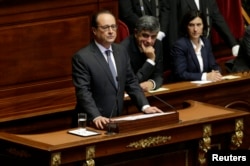In the latest issue of its propaganda magazine, Islamic State crowed that eight of its “knights” brought Paris “down on its knees” in a spree of gun and bomb attacks. It also graphically explains how IS blew up a Russian civilian airliner over Egypt in October, killing all on board with a simple soda can packed with explosives.
The high-profile attacks and the provocativeness of the statements have become a hallmark of the extremist organization’s attempts at generating international hostility against all Muslims, says Murtaza Hussain who writes extensively on Islamic State.
“They want Western governments to start oppressing Western Muslims, and thereby make the IS message more palatable to them, so people will look to [IS] as their only remaining savior,” Hussain told VOA. “They want to rectify the fact that they have little popular support from Muslims, and the only way to generate that support is to create a climate of hostility.”
The tactic appears to be an extension of what IS has achieved regionally in Syria and Iraq. But Hussain says that so far, despite its recent high-profile attacks against France, Russia and Lebanon, that prong of the Islamic State group’s strategy has failed.
“They are doing the right thing: both the French president and President Obama have said they won’t close down their open societies and they won’t close their doors to refugees,” Hussain said.
Help with recruitment
Lawrence Rubin, assistant professor at the Sam Nunn School of International Affairs in Atlanta, questions whether the attack in Paris was the result of IS centralized decision-making and timing. Regardless, Rubin said, the benefit to the extremists will be the same.
“Hitting the West has a symbolic effect which will help recruitment, which is the essential life blood of this group, and also sows dissent between Muslims and the West,” Rubin said.
French President Francois Hollande has said France is at war against the extremist group but at the same time insisted his country will continue to accept Syrian Muslim refugees. Russian leader Vladimir Putin began to coordinate airstrikes with France against IS sites. And the United States intensified its bombing campaign against IS oil shipments.
Hussain said more is needed.
“What we need to do in addition is to be decisive in the conflict on the ground in Syria and Iraq. Something has to be done right now,” he said.
After IS
But even if countries were to risk high numbers of casualties to retake IS-controlled cities and territory in Syria and Iraq, Rubin said that would not solve the next question.
“Everyone wants ISIS gone, but what comes next is the most challenging question. Who is in control?” Rubin asked.
“It is complicated, no question about that,” Secretary of State John Kerry told a gathering of the Overseas Security Advisory Council on Wednesday.
Kerry defended the current U.S. and international strategy against IS, touting recent increased cooperation between Russia and France on the military front, and between Russia, Iran and the U.S. on the political front.
“Most people don’t think that another invasion by Americans in yet another Muslim country in which the local citizens are not prepared to fight back and hold the land that you then gain makes a lot of sense,” Kerry said.
Neil Quilliam, acting head of the Middle East and North Africa Program at Chatham House, recently wrote that it is not enough to carry out airstrikes against IS and cut its funding sources.
Quilliam explained that IS has tapped into strong local grievances in Syria and Iraq, and presented itself as the only alternative to the existing order in those countries. Therefore, he argued in an article originally published by Newsweek, “the only way to undermine ISIS in Syria and Iraq is to make sure that those living under its control can see credible and durable alternatives within their reach.”
Durable political solutions have been hard to come by in Iraq, which is riven by sectarian and ethnic differences, and Syria, where President Bashar al Assad has tried to quell dissent by bombing his own people.















